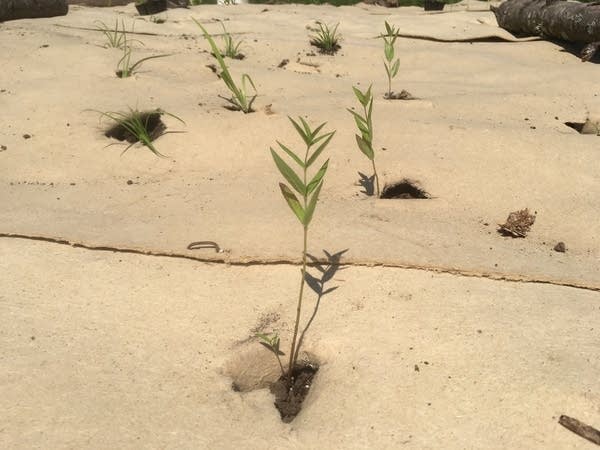Monarch butterfly 'way station' feeds migrating insects in Duluth

Volunteers crouched next to Duluth's popular Lakewalk trail along Lake Superior with hundreds of tiny plants. Where once there was grass, milkweed and other vegetation will create a "way station" for monarch butterflies. It's part of a larger effort to increase habitat for the struggling butterfly in Minnesota and beyond.
Dan Schutte, owner of Shoreview Natives, plants a garden that includes 200 milkweed plants. Monarch butterflies only lay their eggs on milkweed. Once hatched, the caterpillars start eating the milkweed.

"And that's the only plant it eats until it gets to be a full grown larva and then turns into a chrysalis and then out comes the monarch butterfly," Schutte said.
The little garden on the Lakewalk is part of an effort by the city of Duluth and several groups, including Pheasants Forever and the Duluth Monarch Buddies, to build corridors of monarch-friendly habitat. That means milkweed, but also lots of other native plants and flowers that provide nectar for the bright orange and black butterflies when they migrate through Minnesota on their epic journey to Mexico.
Create a More Connected Minnesota
MPR News is your trusted resource for the news you need. With your support, MPR News brings accessible, courageous journalism and authentic conversation to everyone - free of paywalls and barriers. Your gift makes a difference.

What's happening in Duluth is part of a broader effort across the Midwest and the country to improve habitat for the monarch butterfly, whose population has plummeted by nearly 90 percent in the past 20 years or so.
Scientists say several factors have contributed to that population crash, including the use of insecticides.
Karen Oberhauser, who directs the University of Wisconsin Arboretum and is the former head of the Monarch Lab at the University of Minnesota, says the loss of breeding habitat also is a huge problem in the Upper Midwest where milkweed used to grow between rows of crops like corn and soybeans.
"Farmers can now manage weeds in these fields more effectively. We need to make up for the loss of milkweed that came out of corn and soybean," Oberhauser said.
"It needs to be what we call an all-hands-on-deck approach. And that means that we need people in urban areas, in agricultural areas, along rights-of-ways."

Minnesota is part of a group of 16 states that has drafted a strategy to increase habitat along the monarch migratory corridor. That includes a plan to create habitat all along Interstate 35, from Duluth to Texas. Minnesota's ambitious goal is to plant 187 million milkweeds and other plants to provide nectar in the next 20 years.
"We have set our flag in the ground for where we want to get to, and now we have to figure out exactly how we're going to get there, by talking to people all across the state, and figuring out how we can all work together to help this flagship species," said Faith Krogstad, pollinator coordinator with the Minnesota Department of Natural Resources.
Tom Uecker, a retired teacher with the Duluth Monarch Buddies, the group that helped fund the new monarch way station, remembers a time when monarchs seemed much more abundant.
"Almost everybody I talk to these days [says] you just don't see that many anymore. And I want monarch butterflies to be around for generations to come so people can enjoy them too," Uecker said.

"It's amazing how they do it, but they find the milkweed so you plant it and they will be there."